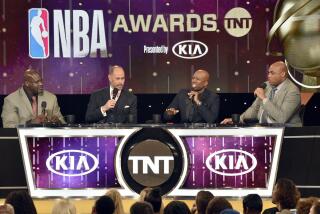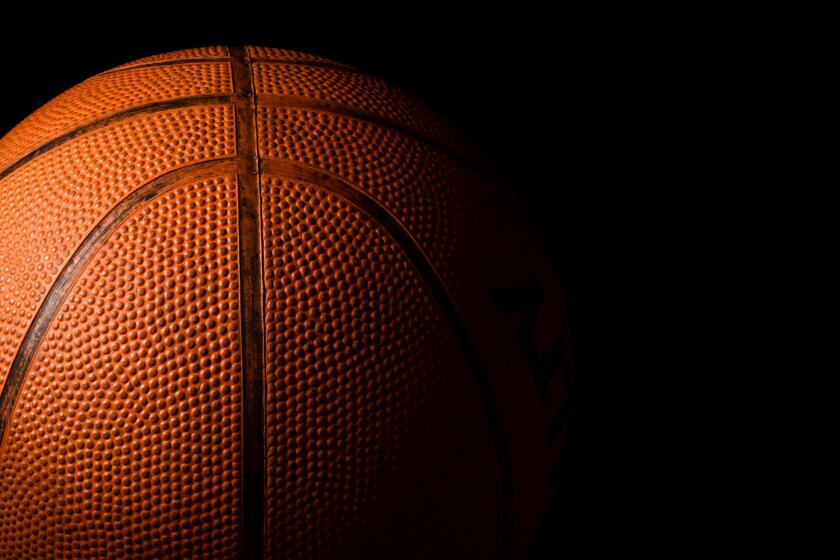THE ORIGINAL DREAM TEAM: One & Only
- Share via
Another team, another dream, another All-American marketing scheme. . . .
Those star-spangled, slam-dunking, scene-stealing, Angolan-elbowing NBA stars are back, billed as Dream Team III, for what that’s worth.
Since the original Dream Team took over the Barcelona Olympics, it has been Dream this and Dream that. O.J. Simpson’s lawyers were called the Dream Team. So were patent failures such as the negotiators for baseball owners, who failed to end the 1994 strike in time to preserve the World Series. The NBA’s follow-up act, the so-called Dream Team II, embarrassed itself so badly at the ’94 world championships, only two members made it to III.
The latest incarnation has conducted itself professionally, give or take a bar fight involving you-know-whom, but it didn’t take long to see it wasn’t the same.
They were outside Cleveland when the boredom hit. Having dispatched pathetically overmatched Brazil in their second exhibition, the U.S. players boarded their chartered flight for the next stop. As a nation, America seemed to stifle a yawn.
“Maybe it’s just me,” said Dan Patrick, narrating highlights on ESPN’s “SportsCenter,” “it’s not really exciting to watch. We’ve been there. We’ve done that.”
Said tag-team partner
Keith Olbermann: “It’s not just you.”
It’s not just them either, although interest remains healthy.
The Brazil and Greece routs were the highest-rated national sports events of their weekends. Despite the tremendous promotional push the women’s team got from corporate partners, NBC and the NBA, the 36,702 the men drew in the Hoosier Dome was bigger than the women’s three biggest crowds combined.
But what could compare to the crazy days at Barcelona, where Cuban boxing great Teofilo Stevenson shouldered past an armed guard to get to Magic Johnson and fawning foreign reporters asked Michael Jordan, “Are you of this earth?” and “How does it feel to be called a god?”
The originals had the game’s holy trinity, Michael, Magic and Larry Bird, and lived up to their galactic billing, thrilling opponents who asked to pose for pictures with them, before and after being routed.
“You will see another team of professionals,” Coach Chuck Daly said after they toasted Croatia by 32, won the gold and scrambled for their jet home, “but I don’t think you’ll see another team like this.”
Proving his point, the second Dream Team, also known as the Young Guns, shot itself in the foot at Toronto in 1994 with an exhibition of playground antics that sent USA Basketball scurrying back to the Old Guns. Only Shaquille O’Neal and Reggie Miller made it from Toronto to Atlanta, NBA officials suggesting it would be a cold day in the off-season before they’d trust Derrick Coleman, Alonzo Mourning and Larry Johnson on a sensitive public relations mission.
However, as Red Auerbach or someone once said, there are no second acts in American basketball. There could be no encore.
Jordan turned down his invitation, even reportedly spurning a proposal from his four main corporate partners to pay him $1 million each.
Bird is happy in retirement.
Johnson wanted to play but withdrew amid signals the selection committee wasn’t interested. Ironically, NBA officials, distressed at Jordan’s stance and keen on adding a personality to the team (it has a merchandise-moving mission too), talked wistfully of Johnson before making their last and most improbable selection--Charles Barkley.
Barkley, the lone problem child at Barcelona, is back in a new role, designated life of the party.
“Let’s hope so,” he says, grinning. “Hope they’re not expecting me to play well.”
This is the new Charlie, older and wiser if only a little more mellow. Before the Brazil game, he was involved in a fight in a bar. Against Australia, he bumped a guard named Shane Heal who was 75 pounds lighter.
Hope they’re not counting on him to turn over a new leaf either.
*
Here’s how great the original Dream Team was: It awed even its own members.
“I don’t think you can really compare playing with Michael and Magic and Larry,” says holdover David Robinson. “That particular group that we had, that one is different. I don’t think there’s anything I’ll be able to compare that to.”
Barkley calls it “the greatest basketball experience of my life,” which, considering the Angolan he elbowed, his never-to-be-forgotten defense (“He might have had a spear”), his little stunts after that and the fans’ whistling at him, is saying something.
“It was a once-in-a-lifetime opportunity,” he says. “I mean, even though this is a dream team, it still can never recapture what happened in 1992. I think any of the players will tell you that.”
Americans distressed by the collegians’ 1988 loss to the Soviets cheered the NBA players’ debut. International fans went wild for them. The foreign press all but attached itself to their ankles; Johnson kept getting questions like, “Oh, Magic, you are so wonderful, when will you come to my country?”
There had been skepticism about how many jaded millionaires would give up a month of their off-season so organizers laid on the luxury, training in La Jolla and Monte Carlo where players watched the topless bathers at the Hotel Intercontinental’s rooftop pool and were given a state dinner by Prince Rainier, which required a special practice session.
“We got a lesson on forks,” Karl Malone says. “I’m not a wine drinker, but they brought us about 30 different wine glasses that we had to drink out of.
“We couldn’t drink until the other top people drank. I’m not used to that, from the South. I’m used to my brothers and sisters just buttin’ in when you want to say something and drinking out of a fruit jar. That’s what I’m used to.”
Predictably, some of them were less impressed by the necessity for protocol than others.
“They gave us all these rules and things about every time he [Rainier] stood up, we had to stand up,” Barkley says. “If he stopped eating, we had to stop eating, stuff like that. I wasn’t really paying attention. I’m not going to stop eating just because somebody else is full.”
This team trained at Moody Bible College in downtown Chicago, attracting only polite interest. Asked, inevitably, how they’d do against the originals--interviewing players assured of squashing opponents is the journalistic equivalent of making conversation on a first date--O’Neal said they would win, but nobody else got into it.
In Chicago, the question fans cared about was: Could they beat our Bulls?
After their first exhibition, when unheralded college players had them down by 17 at halftime before they rallied to pull it out, it didn’t seem like an idle question.
*
In the case of the original Dreamers, the hype was no greater than the show.
They had Jordan, whose presence raised the level of play even in company as exalted as this. Among media members covering that team, there was a theory the second unit would beat the first if it had Jordan.
They had Johnson, coming out of retirement, bent on his first comeback (which he terminated during the ’92 exhibition season).
For such a team, the only challenge was to play hard. For Johnson, the game’s most commanding personality, this was what he did. There was constant competition, scrimmages that turned into wars, motivational tricks to inspire them anew.
In the Tournament of the Americas, U.S. players carried on about the nerve of the free-spirited Brazilian, Marcel Souza, who joked they should get off the golf courses and try harder. Never having heard of Souza, they passed the story among themselves, attributing it to the Brazilian star, Oscar Schmidt, vowing to show him, winning by 44 and laughing when they learned they had the wrong Brazilian.
“Somebody gave me wrong information,” Malone said before the game. “I’ve been telling everybody Oscar said it. At this point it really doesn’t matter who said it. We’re going to act like they all said it.”
Said Johnson: “If we said something about the other teams, they’d use it against us. We’re just like other teams. We’re human. We need motivation.”
They won their Olympic games by an average of 44 points, the most since Bill Russell’s team trounced a non-playing world by 52 a game in 1956, and a mark that may never be matched again.
This U.S. team has three point guards, two of whom, Penny Hardaway and Gary Payton, are modern “shooting ones,” more gifted as scorers than playmakers. The one classic point guard, John Stockton, is a fine player but doesn’t dominate his fellows as Johnson did.
Meanwhile, the world has taken up the game in earnest. In 1992, the NBA had five players from European leagues. In 1996, there were 11, with four new ones on the way, all drafted in the first round.
“I think the novelty will probably wear off piece by piece as these things go on,” Stockton says.
“The other end of it, the other teams will probably start catching up little by little, simply because guys are starting to play here and that’s how you get better. They come over and play in the NBA and piece by piece, other teams are going to get really good.
“Nobody likes to get smoked. That’s what happened last time around. I imagine it will be a little tougher this time. And then the time after. . . . I think even last time, [Drazen] Petrovic and [Toni] Kukoc and [Dino] Radja, they had good teams, but none of them had ever played NBA guys except Petrovic. Now Toni has some years in the league, Radja, all those guys are going to be a little bit better this time, a little less in awe and the same with other teams.”
Of course, a U.S. gold medal remains a safe bet. A real test is a longshot.
Aside from that, just pray everyone keeps out of Barkley’s way. An encore of Barcelona may be out of the question, but they could always redo Toronto.
(BEGIN TEXT OF INFOBOX / INFOGRAPHIC)
DREAM TEAM I
Larry Bird: Forward
Magic Johnson: Guard
David Robinson: Center
Patrick Ewing: Center
Scottie Pippen: Forward
Michael Jordan: Guard
Clyde Drexler: Guard
Karl Malone: Forward
John Stockton: Guard
Chris Mullin: Guard
Charles Barkley: Forward
Christian Laettner: Forward
DREAM TEAM II
Larry Johnson: Forward
Derrick Coleman: Forward
Shaquille O’Neal: Center
Reggie Miller: Guard
Joe Dumars: Guard
Alonzo Mourning: Center
Kevin Johnson: Guard
Steve Smith: Guard
Shawn Kemp: Forward
Dan Majerle: Guard
Mark Price: Guard
Dominique Wilkins: Forward
DREAM TEAM III
Charles Barkley: Forward
Scottie Pippen: Forward
Hakeem Olajuwon: Center
Reggie Miller: Guard
Gary Payton: Guard
David Robinson: Center
Penny Hardaway: Guard
Grant Hill: Forward
Karl Malone: Forward
John Stockton: Guard
Shaquille O’Neal: Center
Mitch Richmond: Forward
More to Read
Go beyond the scoreboard
Get the latest on L.A.'s teams in the daily Sports Report newsletter.
You may occasionally receive promotional content from the Los Angeles Times.










